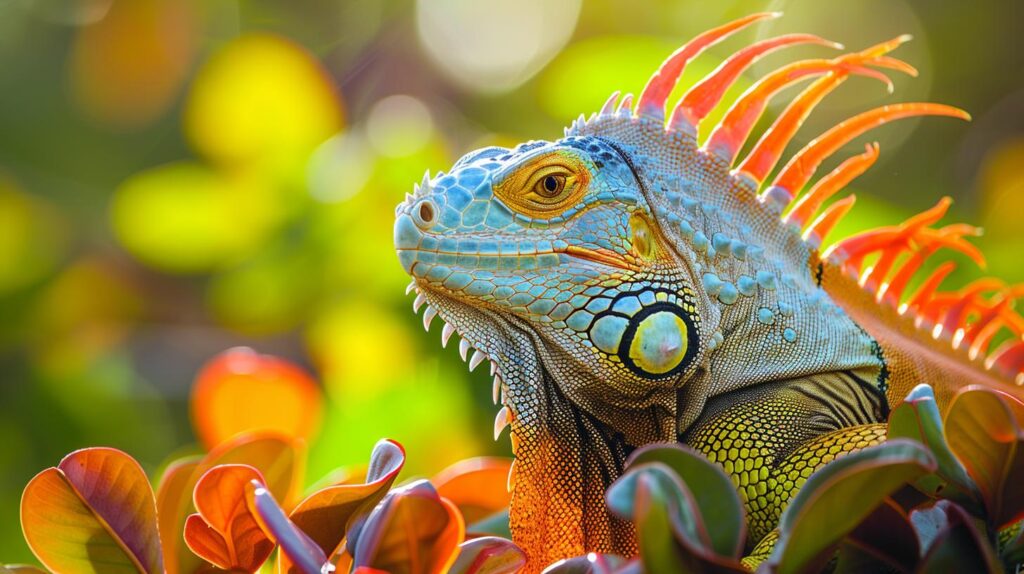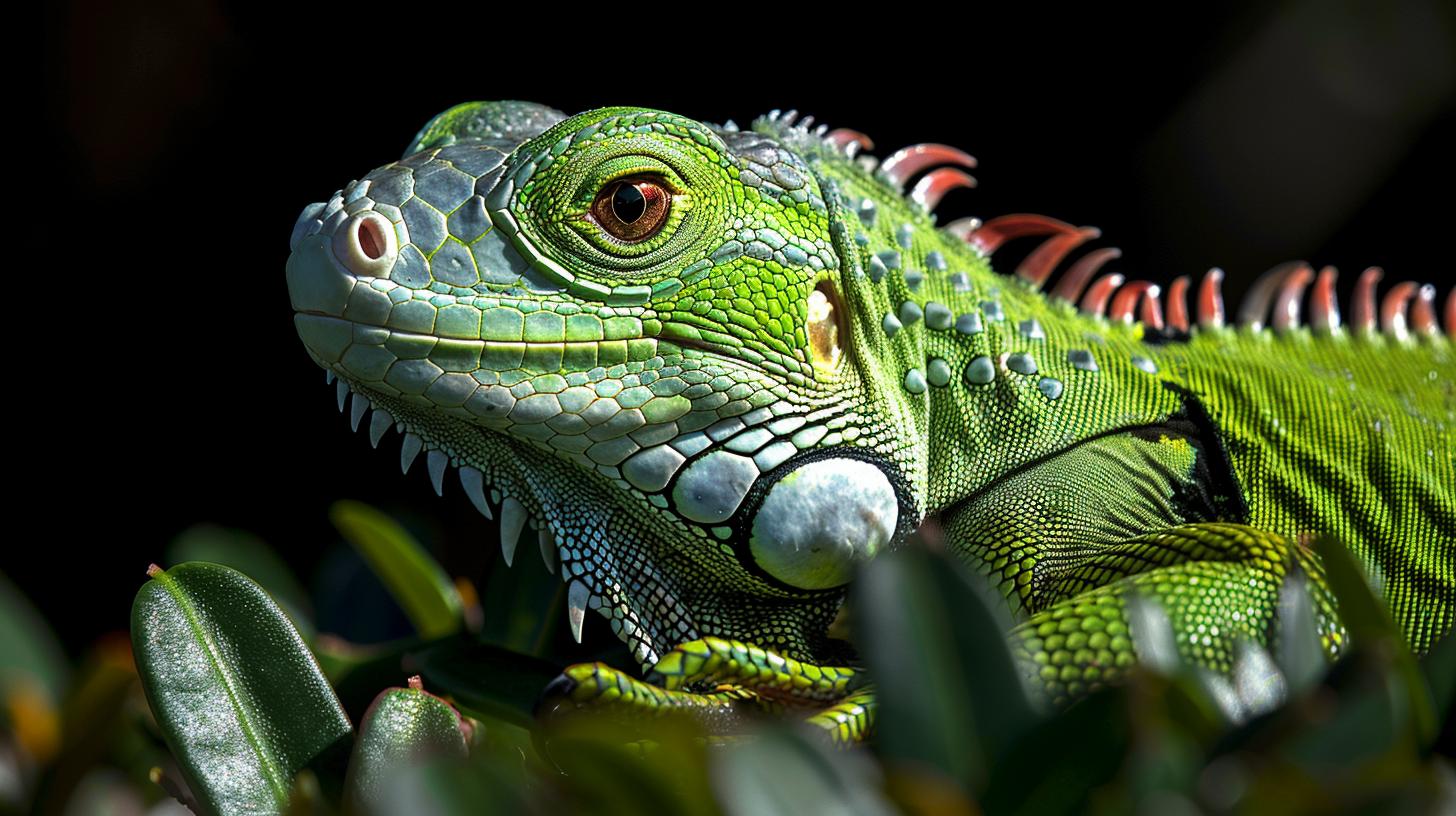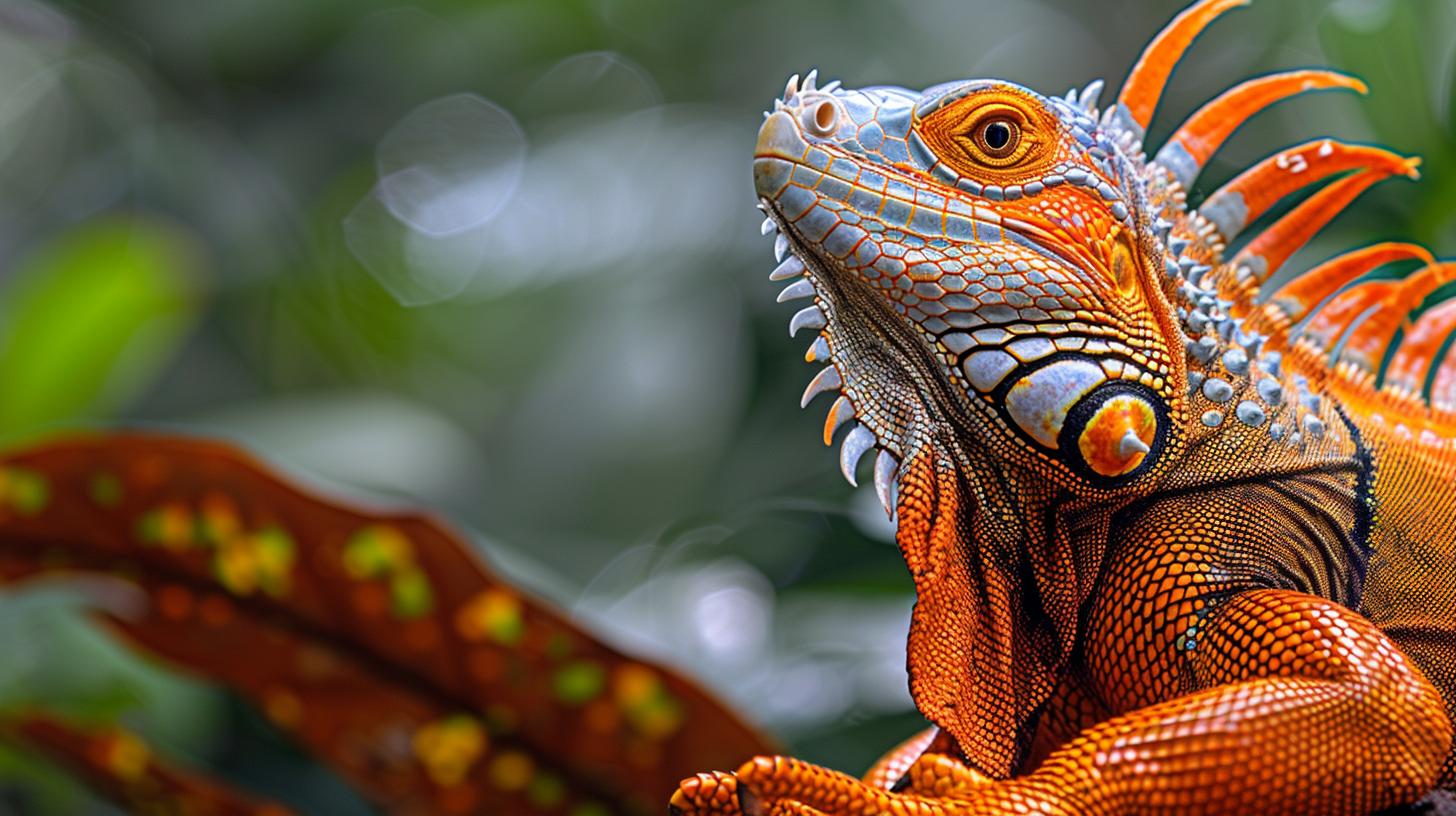Iguanas' Salad Bar: What's Fresh and Safe?

Introduction to Green Delights
For iguana enthusiasts, nothing is quite as crucial as understanding the dietary intricacies that ensure their scaly companions thrive. Iguana food safety should be paramount, guiding every choice from leafy greens to succulent fruits.
At the heart of responsible iguana care lies a deep comprehension of what comprises a balanced, nutritious diet tailored for these herbivorous creatures. Iguanas, in their natural habitats, feast on an array of vegetation, suggesting that creating a diverse "salad bar" isn't just beneficial-it's essential for mirroring the rich diet they would enjoy in the wild.
Diving into the basics of iguana nutrition, it becomes evident why a meticulous selection of meals is imperative. These reptiles require a blend of calcium, vitamins, particularly vitamin D3 for proper absorption of calcium, and fiber to support their digestive systems and ensure robust health.
Each nutrient plays a pivotal role; calcium fortifies bones while vitamins boost overall wellness and fiber aids in smooth digestion. This foundational knowledge empowers pet owners to craft diets that not only entertain but sustain their iguanas, steering clear of malnutrition and its adverse effects.
Turning our attention to greens, it's important to discern which vegetables are most advantageous for your green companion. A rotation among safe leafy greens ensures not only a palate-pleasing variety but also wards against nutritional deficiencies that can occur with monotony.
Embracing diversity in vegetation introduces a spectrum of vital nutrients to an iguana's diet, simulating the richness they'd encounter in their natural feeding grounds. As we navigate through this salad selection process, remembering core principles-variety, nutrition balance, and freshness-will guide us toward fostering vibrant health in our arboreal friends.
The Basics of Iguana Nutrition
Understanding the complexities of iguana nutrition is paramount for ensuring their longevity and health. Unlike many pets that can thrive on a simple diet, iguanas require a meticulously balanced variety of nutrients to mirror their natural herbivorous feeding habits in the wild.
This necessity stems from their unique physiological makeup, which relies heavily on a rich intake of vitamins, minerals, and fiber to support everything from their digestive system to their vibrant skin. As such, owners must become versed in the essential components that constitute a healthy iguana diet, setting the foundation for robust vitality.
Key nutrients such as calcium, vitamins (particularly vitamin D3), and fiber emerge as crucial pillars within an iguana's dietary framework. Calcium plays a vital role in bone development and maintenance, while vitamins and fiber aid in digestion and overall bodily functions.
However, achieving the right balance is not always straightforward - too little of one nutrient or too much of another can lead to health issues varying from metabolic bone disease to obesity. Therefore, understanding each component's significance within your iguana's diet is the first step towards crafting meals that not only entice but nourish.
Nutritional Essentials for Iguanas
At the core of proper iguana nutrition is calcium-to-phosphorus ratio, an aspect critical enough to warrant close attention when selecting food items for your pet's salad bar. Ideal ratios range from 1.5:1 to 2:1 calcium to phosphorus to prevent potential absorption issues leading to skeletal problems over time.
Similarly important is vitamin D3, a nutrient indispensable for calcium absorption yet challenging to provide through diet alone. This underscores the necessity of either adequate UV lighting-mimicking sunlight exposure-or dietary supplements specifically designed for reptile health.
Incorporating sufficient fiber into your iguana's meals facilitates optimal gut function and mimics their high-fiber wild foliage consumption pattern. Dark leafy greens typically boast high fiber content alongside being rich in other essential vitamins and minerals beneficial for your pet's health. Yet, striking a balance between these components demands informed selection, underpinning why knowledge on safe and nutritious greens plays a critical role in meal preparation.
Averting Nutritional Mishaps
Awareness on iguana food safety becomes crucial when navigating through various food choices available for your reptilian companion. Just as certain nutrients are necessary for thriving health, others-in particular foods-pose significant risks if incorporated into an iguana's diet even unwittingly. Toxicity concerns with some vegetables or fruits highlight the importance of staying informed about what's safe versus what could potentially derail your pet's wellness journey unintentionally.
Moreover, considering an iguana's sensitive digestive system further amplifies the need for vigilance against overly fibrous or sugary foods that can disrupt gut flora balance leading to gastrointestinal distress or worse-nutritional secondary hyperparathyroidism due to imbalanced diets lacking in key nutrients like calcium or vitamin D3.
In essence, building a strong foundation in iguana nutrition enables owners not only to provide varied and enjoyable meals but also instills confidence in tackling dietary challenges with informed decisiveness ensuring these fascinating creatures lead long and healthy lives under human care.
Safe and Nutritious Greens for Your Iguana
In the quest to mold the perfect diet for our reptilian companions, understanding what constitutes safe and nutritious greens for iguanas is paramount. Mere observation of an iguana's natural habitat reveals a penchant for a variety of leafy vegetation, hinting at the diverse palette these creatures enjoy. However, integrating this diversity into an iguana's diet isn't just about variety-it's about ensuring each meal contributes positively to their health.
Green vegetables are the cornerstone of a healthy iguana diet, providing essential nutrients that support vital functions. Amongst the myriad of options, certain greens stand out both for their nutritional content and safety. For instance:
- Collard greens: Rich in calcium and vitamins A, C, and K, collard greens support bone health, immune function, and blood clotting.
- Dandelion greens: Not only are they high in calcium but also vitamin K, which plays a crucial role in heart health and bone density.
- Mustard greens: Packed with antioxidants and fiber, mustard greens can help combat oxidative stress while promoting digestive health.
It's important to wash all vegetables thoroughly to remove pesticides or contaminants that might harm your pet. This step is crucial in maintaining *iguana food safety*, ensuring that your pet remains healthy and free from potential toxins.

While it might be tempting to stick to a few favorites considering their known benefits, varying the types of greens you offer is essential. Incorporating a rotating selection of safe vegetables prevents nutritional imbalances and keeps meals exciting for your iguana. Some owners opt to introduce one new vegetable at a time to monitor any adverse reactions-which is an excellent strategy not just for dietary diversity but also for ongoing health checks.
Moving forward from green staples to other dietary requirements will further cement the foundation of *iguana food safety* while ensuring your scaly friend receives all necessary nutrients without exposure to harmful foods. The journey through creating an apt salad bar doesn't end here; it transitions next into discerning fruit choices-sprinkling sweet into the mix with caution due to their high sugar content-before delving deeper into meal preparation tips tailored for these majestic green beings.
Fruits
Incorporating fruits into an iguana's diet can be likened to offering a child candy-it should be done sparingly and thoughtfully. While fruits can provide essential vitamins, they also come with higher sugar content which isn't ideal for iguanas in large quantities.
The key is to select fruits that offer nutritional benefits without the risk of overfeeding sugar. For instance, choices like papaya, mango, and cantaloupe are excellent because they supply vitamins A and C but must be given in moderation.
Moreover, it's crucial to understand the concept of *iguana food safety* when incorporating these sweet treats into their meals. Not every fruit that is safe for human consumption is suitable for iguanas, emphasizing the need for owners to familiarize themselves with those that are specifically nutritious and non-toxic for their reptilian pets.
Additionally, since iguanas can have individual preferences and dietary reactions similar to humans, monitoring how your pet responds to different types of fruit is essential. Introducing one type of fruit at a time can help pinpoint any adverse reactions or preferences.
Finally, presentation matters even in the animal kingdom. Cutting fruits into manageable pieces and mixing them sparingly with greens can make a more appealing meal for iguanas, enhancing their overall eating experience while ensuring they don't consume too much sugar. Balancing fruits with a variety of leafy vegetables will ensure your iguana gets the nutrition it needs without compromising its health.
| Fruit | Benefits |
|---|---|
| Papaya | High in Vitamins A and C; aids digestion |
| Mango | Rich in Vitamin C; antioxidants support immune system |
| Cantaloupe | Provides Vitamin A; hydrates due to high water content |
Foods to Avoid
When crafting a nutritious diet for iguanas, it's just as important to know which foods to exclude as it is to know which to include. The concept of *iguana food safety* is vital, ensuring that these reptilian companions aren't exposed to anything that could jeopardize their health.
While iguanas can enjoy a diverse array of greens and fruits, there are certain items that must never find their way into an iguana's salad bar. Understanding these dietary restrictions helps pet owners avoid unintentional harm, supporting the well-being and longevity of their scaly friends.
Navigating through the myriad of available food options can be daunting. It's essential to bear in mind that some foods, while harmless or even beneficial to humans, pose significant risks when ingested by iguanas. This aspect of pet care requires vigilance and an informed approach to feeding practices. By emphasizing healthy feeding habits, owners can create a safe environment that nurtures their iguanas' growth without exposing them to unnecessary dangers.
Toxic Vegetables and Fruits
Certain vegetables and fruits are known for being particularly dangerous for iguanas. Rhubarb, for instance, contains oxalic acid in high amounts, which can lead to kidney failure in reptiles. Similarly, avocados contain persin, a fungicidal toxin that can prove fatal if consumed by iguanas.
These examples underscore the critical need for awareness around the specific health effects various foods have on different species. By identifying such toxic ingredients and keeping them away from their pets' meals, iguana owners ensure safer eating experiences and safeguard against potential health complications.
Other Harmful Items
Beyond the realm of plants are other items traditionally considered harmless or beneficial in human diets but detrimental when included in the diet of an iguana. Dairy products are a prime example; since iguanas lack the necessary enzymes to break down lactose properly, any form of dairy can lead to digestion issues and discomfort.
Likewise, foods rich in oxalates should be avoided due to their capacity to bind calcium-a crucial mineral for reptiles-thereby preventing its absorption and potentially leading to metabolic bone disease over time.
In summary, maintaining optimal iguana food safety involves not just knowledge about what nutrients are necessary but also vigilance against potential dietary hazards. By eradicating toxic or harmful substances from their diets and tailoring feeding practices according to established guidelines on safe ingredients, owners significantly contribute towards fostering healthier lives for their iguanas.
Preparing the Perfect Iguana Salad
Creating a nutritious and appealing salad for your iguana is more than just tossing together a few greens. Understanding iguana food safety is paramount to ensure that every meal you provide supports their health and well-being. Selecting the right mix of vegetables and fruits, while keeping in mind those crucial nutrients, can be likened to crafting a gourmet meal tailored to your pet's specific dietary needs.

When it comes to preparing an iguana-friendly salad, variety is key. You'll want to include:
- Leafy Greens: These should form the basis of the salad. Opt for dark, leafy vegetables such as collard greens, dandelion greens, and mustard greens. Variety here is not only crucial for nutritional balance but also keeps meals interesting for your iguana.
- Vegetables: Introduce a range of non-leafy vegetables like butternut squash, zucchini, and bell peppers to add color and texture to the mix. These are excellent sources of additional vitamins.
- Fruits: While fruits should be offered sparingly due to their sugar content, small portions can be included for sweetness and variety. Papaya, mango, and berries are safe options that are also high in vitamins.
Incorporating these elements ensures that your iguana receives a balance of *calcium*, *vitamins*, and *fiber*, essential for maintaining strong bones and digestive health.
Next, consider the preparation process itself. Washing all ingredients thoroughly is critical to remove any pesticides or chemicals that could harm your pet. It's advisable to opt for organic produce whenever possible to minimize these risks further. Chopping vegetables and fruits into manageable pieces enhances digestibility while making it easier for your iguanas to eat.
One aspect often overlooked when preparing iguana meals is presentation. Iguanas have keen eyesight; thus, an attractively arranged meal can entice them into consuming a balanced diet-mix colors and textures to create an inviting feast that encourages exploration and consumption.
While this guide serves as a starting point in ensuring iguana food safety and nutritional adequacy, remember that each iguana has its preferences. Observing your pet's reactions to different ingredients will help you tweak meals towards their liking while keeping nutrition front and center.
As we delve deeper into understanding our reptilian companions' needs, nurturing them with carefully prepared dishes becomes an act of love aimed at fostering their longevity and happiness. This journey continues as we explore monitoring techniques in the next section of our article, focusing on how dietary adjustments play a critical role in maintaining optimal health in our beloved iguanas.
Monitoring Your Iguana's Health Through Diet
In wrapping up our comprehensive journey through "Iguanas' Salad Bar: What's Fresh and Safe? ", we've traversed from the foundational dietary needs of these fascinating herbivores to the nuances of ensuring their meals are both nourishing and enjoyable. The symbiotic relationship between what an iguana eats and its overall health cannot be overstated.
By prioritizing a diet rich in safe, nutritious greens, while understanding the sweet balance necessary when incorporating fruits, pet owners can significantly impact their iguana's longevity and vitality. This reflects a broader philosophy inherent to all aspects of pet care-knowledge, attention, and adaptation are key to fostering a flourishing life for our scaled companions.
Emphasizing iguana food safety has illuminated not just the hazards lurking in common human foods but also underscored the critical importance of selective feeding practices. Whether it's avoiding toxic vegetables or moderating fruit intake, each decision contributes to a tapestry of care that supports robust health.
Moreover, the steps involved in selecting, preparing, and presenting these meals do more than just satisfy nutritional requirements; they deepen the bond between iguanas and their owners, transforming routine feedings into acts of nurturance.
As you continue on your journey as an informed and compassionate iguana owner, remember that every piece of knowledge you acquire further enriches your pet's life. And this article is but a starting point.
For those hungry for more insights into pet care or eager to expand their understanding across various topics, our website offers a treasure trove of articles designed to inform and inspire. Dive into our collection today - let your curiosity lead you to discover more about how best to nurture the incredible animals that share our lives.
Frequently Asked Questions
What Are the Hazards of an Iguana?
Iguanas, primarily when they feel threatened, can pose several hazards to humans and pets. Their tail, used as a defensive tool, can deliver a powerful whip that might cause bruises or breaks in the skin.
Additionally, iguanas have sharp claws and teeth that can inflict cuts or bites if they feel cornered or handled improperly. They also carry Salmonella bacteria, which can be transferred to humans through direct contact or contaminated surfaces, leading to serious health issues.
Are You Allowed to Feed Iguanas in Florida?
Feeding iguanas in Florida is not recommended due to the negative impacts it has on their natural behavior and the ecosystem. Habitual feeding can cause iguanas to lose their fear of humans, potentially leading to an increase in aggressive encounters.
Moreover, human food is not suitable for iguanas and may harm their health. Laws regarding feeding wildlife vary by location; therefore, it's important to consult local regulations.
Which Foods Should Be Avoided in Excess in an Iguana's Diet and Why?
In an iguana's diet, foods high in oxalates and goitrogens should be limited because they inhibit calcium absorption and thyroid function respectively. Foods rich in oxalates include spinach and beet greens, while those containing goitrogens include cabbage and kale. A diet with excessive amounts of these foods can lead to nutritional deficiencies and health problems over time.
Is It Legal to Hunt Iguanas in Florida?
In Florida, it is legal to hunt iguanas without a permit on one's own property or on public lands where hunting is allowed because they are considered invasive species with no protections under state law.
However, anyone looking to control iguana populations through hunting must do so humanely and follow local ordinances regarding discharge of firearms or other methods of removal.
Do Iguanas Carry Botulism?
Iguanas themselves do not carry botulism; however, they can be carriers of Salmonella bacteria which poses significant health risks if transmitted to humans through contact with the reptiles or contaminated surfaces. Proper hygiene practices such as washing hands thoroughly after handling iguanas or their habitats are crucial to prevent salmonellosis.
Is It OK to Touch Iguanas?
While touching iguanas might seem harmless, it's important for individuals who choose to interact physically with them always wash their hands immediately afterward due to the risk of transmitting Salmonella bacteria from the riduna Humans should also be cautious as iguanas may become stressed or defensive when touched, potentially leading bites ora or scratches from their sharp claws.
Leave a Reply
You must be logged in to post a comment.